新概念英语第一册Lesson75~84课文注释
新概念英语第一册Lesson75~80课文翻译及学习笔记(最新)
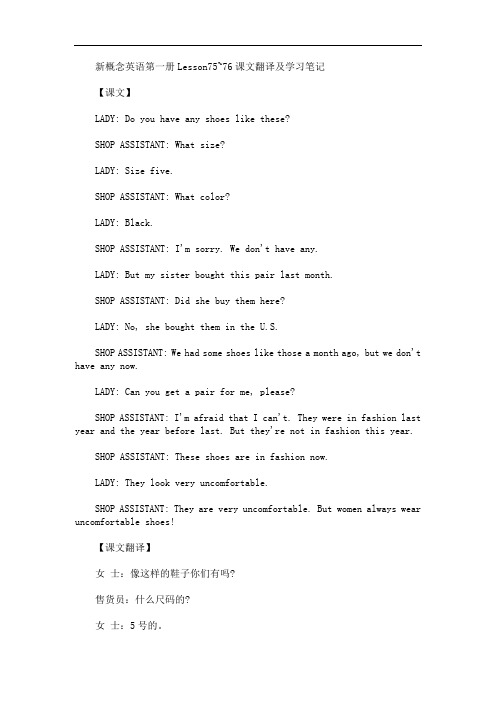
新概念英语第一册Lesson75~76课文翻译及学习笔记【课文】LADY: Do you have any shoes like these?SHOP ASSISTANT: What size?LADY: Size five.SHOP ASSISTANT: What color?LADY: Black.SHOP ASSISTANT: I'm sorry. We don't have any.LADY: But my sister bought this pair last month.SHOP ASSISTANT: Did she buy them here?LADY: No, she bought them in the U.S.SHOP ASSISTANT: We had some shoes like those a month ago, but we don't have any now.LADY: Can you get a pair for me, please?SHOP ASSISTANT: I'm afraid that I can't. They were in fashion last year and the year before last. But they're not in fashion this year.SHOP ASSISTANT: These shoes are in fashion now.LADY: They look very uncomfortable.SHOP ASSISTANT: They are very uncomfortable. But women always wear uncomfortable shoes!【课文翻译】女士:像这样的鞋子你们有吗?售货员:什么尺码的?女士:5号的。
售货员:什么颜色?女士:黑的售货员:对不起,我们没有。
(完整版)新概念英语第一册第75-76课-Uncomfortableshoes
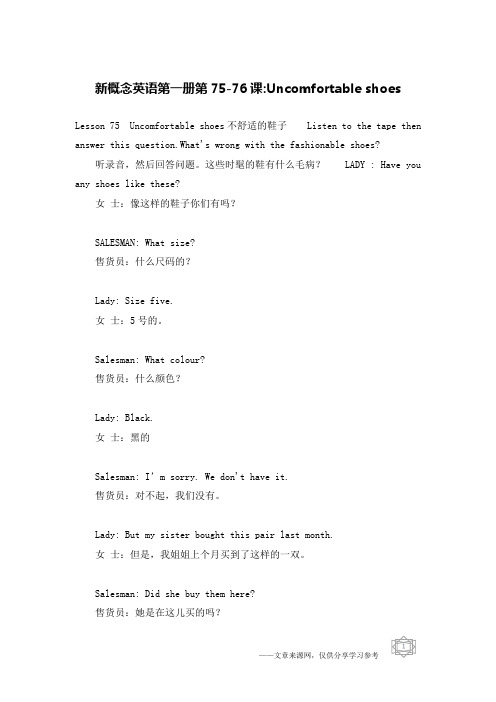
新概念英语第一册第75-76课:Uncomfortable shoesLesson 75 Uncomfortable shoes不舒适的鞋子Listen to the tape then answer this question.What's wrong with the fashionable shoes?听录音,然后回答问题。
这些时髦的鞋有什么毛病?LADY : Have you any shoes like these?女士:像这样的鞋子你们有吗?SALESMAN: What size?售货员:什么尺码的?Lady: Size five.女士:5号的。
Salesman: What colour?售货员:什么颜色?Lady: Black.女士:黑的Salesman: I’m sorry. We don't have it.售货员:对不起,我们没有。
Lady: But my sister bought this pair last month.女士:但是,我姐姐上个月买到了这样的一双。
Salesman: Did she buy them here?售货员:她是在这儿买的吗?Lady: No, she bought them in the U.S.女士:不。
她是在美国买的。
Salesman: We had some shoes like those a month ago, but we haven’t any now.售货员:一个月前我们有这样的鞋。
但是现在没有了。
Lady: Can you get a pair for me please?女士:您能为我找一双吗?Salesman: I’m afraid that I can’t. They were in fashion last year and the year before last.But they’re not in fashion this year.售货员:恐怕不行。
新概念1第75课

not long ago 不久之前
I went to London three days ago. 我三天前去的伦敦。
buy
buy v. 买 (bought) sell (sold)
buyer n. 购买者 seller n.卖者 售出之物
My sister often buys dresses.
我妹妹经常买裙子。
wear a beard 留胡须 I wear the same coats every day. ② v. 面带;呈现;保持 He’s wearing a cheerful smile.
我每天都穿同一间外套。 他面带欢快的笑容。
Grammar(重点语法)
Do you have any shoes like these?
改错: 1 We didn't went out last Friday.______________________ 2 Did you had a good time yesterday?______________________ 3.He taughts me English last year.______________________ 4.Did you saw him just now.______________________ 5.Tom wasn't watch TV last night.______________________ 6.I didn't my homework yesterday.______________________ 7.He wait for you three hours ago.______________________ 8.Who find it just now ?______________________
新概念第一册课文翻译及学习笔记【Lesson73、75、77】

新概念第一册课文翻译及学习笔记【Lesson73、75、77】【课文】Last week Mrs. Mills went to London. She does not know London very well, and she lost her way.Suddenly, she saw a man near a bus stop. 'I can ask him the way.' She said to herself.'Excuse me,' she said. 'Can you tell me the way to King Street, please?'The man smiled pleasantly. He did not understand English! He spoke German. He was a tourist.Then he put his hand into his pocket, and took out a phrasebook.He opened the book and found a phrase. He read thephrase slowly.'I am sorry,' he said. 'I do not speak English.'【课文翻译】上星期米尔斯夫人去了伦敦。
她对伦敦不很熟悉,所以迷了路。
突然,她在公共汽车站附近看到一个男人。
“我能够向他问路,”她想。
“对不起,您能告诉我到国王街怎么走吗?”她说。
这人友好地笑了笑。
他不懂英语!他讲德语。
他是个旅游者。
然后他把手伸进了衣袋,掏出了一本常用语手册。
他翻开书找到了一条短语。
他缓慢地读着短语。
“很抱歉,” 他说,“我不会讲英语。
”【生词】week n. 周London n. 伦敦suddenly adv. 突然地bus stop 公共汽车站smile v. 微笑pleasantly adv. 愉快地understand (understood ) v. 懂,明白speak (spoke ) v. 讲,说hand n. 手pocket n. 衣袋phrasebook n. 短语手册,常用语手册phrase n. 短语slowly adv. 缓慢地【知识点讲解】在新概念一的课本里,73课前面有一个小测试,有书的同学能够自己做一下检验一下学到现在的水平。
新概念第一册 Lesson 75-76
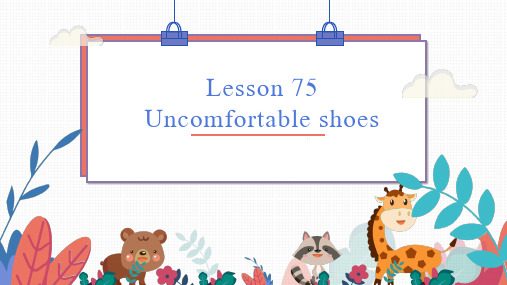
SHOP ASSISTANT: I’m afraid that I can’t. They were in fashion last year.
I’m afraid…我恐怕……。and the year before last.
But they’re not in fashion this year.
in the U.S.
SHOP ASSISTANT: We had some shoes like those
a month ___,
but we don’t have any ____.
LADY:
Can you ___ a pair ___ me, please?
SHOP ASSISTANT: I’m ____ that I can’t. They were in fashion last year.
pair /peə(r)/ n. 双,对
wear /weə(r)/ (wore /wɔː(r)/) v. 穿着
ago ago /əˈɡəu/ adv. 以前 1 day ago 一天前 5 minutes ago 5分钟前 long time ago 很久以前
buy buy /baɪ/ (bought /bɔːt/) v. 买 (反) sell /sel/ (sold /səuld/) v. 卖
Black.
SHOP ASSISTANT: I’m sorry. We don’t have any. any后面省略了black shoes。
LADY:
But my sister bought this pair last month.
SHOP ASSISTANT: Did she buy them here?
新概念第一册75课课件
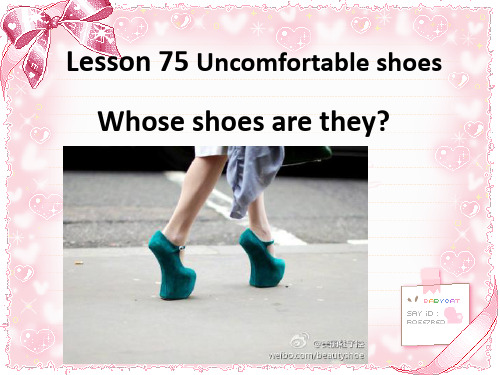
宾语从句
• 在英语中,一般是名词或代词做宾语,宾 在英语中,一般是名词或代词做宾语, 语一般是跟在动词或介词后。 语一般是跟在动词或介词后。 I want an apple. Put on it! • 由一个句子来充当宾语,就是宾语从句。 由一个句子来充当宾语,就是宾语从句
宾语从句跟在两类词后: 宾语从句跟在两类词后: 1. 表示人的情感或心理活动的形容词 afraid/ sure/ sorry/ glad/ anxious/ confident/ proud • S+ be+ adj. + 宾语从句 • 主句和宾语从句中有 主句和宾语从句中有that连接,后边加句子。 连接, 连接 后边加句子。 当主句是一般现在时,从句可以用任何时态。 当主句是一般现在时,从句可以用任何时态。 • 我担心我明天去不了了。 我担心我明天去不了了。 I am afraid that I can't come tomorrow. • 很抱歉我昨天没有去。 很抱歉我昨天没有去。 I am sorry that I didn't go yesterday. • 我跟高兴你能帮助他们。 我跟高兴你能帮助他们。 I am glad that you can help them.
★ago adv. 以前 • ago 用于一般过去时;从现在的以前 用于一般过去时; • before 只能用于过去完成式;是从过去的某 只能用于过去完成式; 一点算起 • 我三天前去的伦敦。 我三天前去的伦敦。 I went to London three days ago. • 她30分钟前离开的。 分钟前离开的。 分钟前离开的 She left 30 minutes ago. • 很久很久以前,这里住着一位国王。 很久很久以前,这里住着一位国王。 Long long ago, there lived a king. • 我昨天还没到车站之前,火车就开走了。 我昨天还没到车站之前,火车就开走了。 Before I arrived at the station yesterday, the train had already left.
新概念第一册第75课 不舒服的鞋子 Lesson 75 Uncomfortable shoes
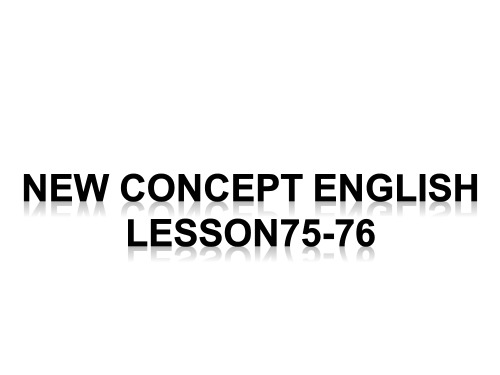
• LADY: Black. • SHOP ASSISTANT: I'm sorry. We don't have any.
LADY: But my sister bought this pair last month. • Buy-bought • Pair • a pair of shoes / trousers
fashionable
• fashion.n.流行 • in fashion • out of fashion
US5的话是34.5码
7.20.2015
7.20.2014
7.20.2013
• Mar.21st 2015
2015
2014
• What does the lady show to the shop assistant? • A pair of shoes. • Why does she show him those shoes? • Because she wants a pair like them. • Where did her sister buy those shoes? • In the U.S. • When did the shop have some shoes like these? • A month ago. • Can they get any shoes like those now,
SHOP ASSISTANT: Did she buy them here?
• did + 动词原形
LADY: No, she bought them in the U.S.
• 省略一句话 • No, she didn’t buy them here. • She bought them in the U.S.
新概念第一册75-76课课件

★uncomfortable adj. 不舒服的 ① adj. 不舒服的 She feels uncomfortable in tight boots. ② adj. 不安的;不自在的
• He often feels uncomfortable with strangers.
★wear v. 穿着 • wear/wears/wore/wearing
A bottle of wine A hand of banana
A loaf of bread A bar of chocolate
★fashion n. (服装的)流行式样 • be in fashion ……是流行的
This color is in fashion this year. • be out of fashion 不流行
I wear the same coats every day. He wears a tie every day. The lady is wearing a beautiful dress.
• wear 表穿着的状态 That girl wears a pink shirt every day.
adv. 以前 v. 买 n. 双,对 n. (服装)流行式样 adj. 不舒服的 v. 穿着
★ago adv. 以前 • ago 用于一般去时;从现在的以前
I went to London three days ago. She left 30 minutes ago. Long long ago, there lived a king.
• put on 表穿上的动作 Please put on your coat.
课文讲解
Lesson 76 When did you ........?
- 1、下载文档前请自行甄别文档内容的完整性,平台不提供额外的编辑、内容补充、找答案等附加服务。
- 2、"仅部分预览"的文档,不可在线预览部分如存在完整性等问题,可反馈申请退款(可完整预览的文档不适用该条件!)。
- 3、如文档侵犯您的权益,请联系客服反馈,我们会尽快为您处理(人工客服工作时间:9:00-18:30)。
新概念英语第一册Lesson75~84课文注释
新概念英语第一册Lesson75~76课文注释
1 like these 是介词短语作定语,修饰 shoes。
意思是“像这样的鞋子”。
2 We don't have any.
any 后面省略了black shoes。
3 ago放在表示时间长度的短语的后面,常与表示一般过去时的动词连用。
如 a month ago(一个月之前)。
4 in fashion, 流行的,时髦的。
5 I'm afraid…我恐怕……。
新概念英语第一册Lesson77~78课文注释
1 Can't the dentist see me now?
这是情态动词的否定疑问句,表示请求。
2 a.m.,“上午”,p. m. 是指“下午”。
10a.m.,上午10点,
2p.m., 下午两点。
新概念英语第一册Lesson79~80课文注释
1 make a shopping list, 写一张采购物品的单子。
2 a lot of 当“很多”讲,既可用在可数名词前,又能用在不可数名词前,一般用于肯定句。
3 We haven't got any meat at all. 我们一点肉也没有了。
at all 这个词组用在否定句中,表示“丝毫”、“一点”、“根本”的意思,有强调作用。
have got 与have(“有”)同义。
4 many 和 much 均可译成“很多”,但用法不同: many 主要用
于疑问句和否定句中,放在可数名词之前,如 many tomatoes; much
用于疑问句和否定句中,放在不可数名词之前,如 much tea, much money。
新概念英语第一册Lesson81~82课文注释
1 在第13课中我们见到了这样的句子:Come upstairs…, 其中
的 upstairs 表示动作的方向。
本课中的He's upstairs. 则表示他的方位,其中的upstairs可译为“在楼上”。
2 He's having a bath. 他正在洗澡。
在本课中,动词 have 后
面接名词或名词短语,有“实行”“从事”的意思,如 have a bath, have a cigarette, have a glass of whisky, have dinner, have lunch等。
新概念英语第一册Lesson83~84课文注释
1 在英语中,现在完成时主要用于以下两种情况:(1)表示在过去
不确定的时间里发生的并与现在有着某种联系的动作;(2)表示开始于
过去并持续到现在的动作。
本课中萨姆的3句话属于第一种情况,正
是因为他吃了饭、喝过了咖啡、也休过假,所以他谢绝了汤姆的邀请,并表示今年已无可能再次休假。
现在完成时是由have的现在式加上过
去分词组成。
规则动词的过去分词与过去式相同,而不规则动词的过
去分词则无统一的规律可言。
从本课起不规则动词还将列出过去分词
的拼写和读音。
2 I've already had lunch. 注意 already 的语序。
在一般情况下,它跟在助动词后面。
3 Excuse the mess. 意思是:“乱七八糟,请原谅。
”
4 have a holiday, 度假。
have 在不同词组中,意思不同。
如: have lunch, 吃午饭;have a cup of coffee, 喝杯咖啡。
5 stay at home, 呆在家里,注意名词 home之前不加任何冠词。
在诸如 go home, arrive home的短语中,home是副词。
